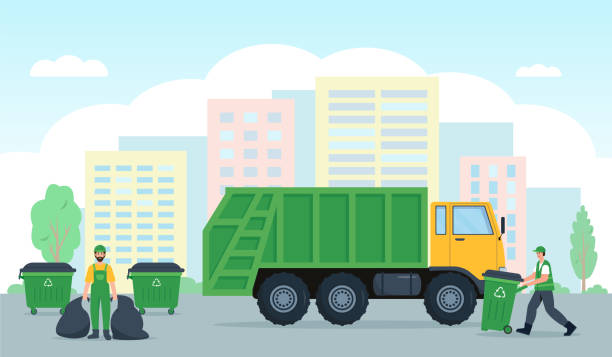Key Takeaways:
- It is essential to understand how effective waste management impacts the environment.
- Insightful tips on how households and businesses can manage waste responsibly.
- It is crucial to reduce, reuse, and recycle to minimize waste.
- Introduction to modern waste management solutions, including dumpster services.
- Links to additional resources for a deeper understanding of waste management strategies.
Introduction to Waste Management
Effective waste management is essential in maintaining public health, environmental integrity, and economic viability. By employing strategies to manage waste responsibly, we can significantly reduce the negative impacts on our planet. Waste management involves a comprehensive approach that includes waste collection, transportation, and disposal or recycling. This ensures that waste is handled efficiently and sustainably, benefiting the environment and the economy. While modern solutions and services are available to aid these efforts, understanding the basics is critical to fostering a responsible attitude toward waste management. Additionally, implementing these practices can lead to cost savings, as reducing waste often means using resources more efficiently.
Environmental Impact of Poor Waste Management
The consequences of improper waste management are far-reaching. Poorly managed waste can lead to severe environmental problems, including pollution and climate change. Companies offering commercial dumpster service provide crucial support in this endeavor. Understanding the specific ways in which waste mismanagement can harm the planet is vital so we can take proactive steps to mitigate these effects.
- Air and water pollution: Toxic substances and harmful chemicals can seep into the ground and water sources, polluting drinking water and damaging underwater ecosystems. Examples include industrial waste dumping and leachate from landfills, which can have long-lasting effects on ecosystems.
- Greenhouse gas emissions: Breaking down garbage in landfills creates methane, a strong greenhouse gas that plays a major role in climate change. Methane is approximately 25 times more effective than carbon dioxide at trapping atmospheric heat.
- Impact on wildlife and natural habitats: Waste can destroy habitats, kill animals through ingestion or entanglement, and contribute to biodiversity loss. Marine animals, for instance, often mistake plastic waste for food, leading to fatal ingestion.
Steps to Effective Waste Management
Implementing effective waste management practices requires a concerted effort by both individuals and businesses. Here are some steps that can be taken to improve waste management practices:
- Conduct a waste audit: Assess the types and quantities of waste generated to identify opportunities for reduction and recycling. This involves cataloging waste and understanding its sources, which can inform targeted reduction strategies.
- Implement waste reduction strategies: Adopt practices that reduce the waste generated, such as opting for products with minimal packaging or using digital documents instead of printed ones. Businesses can also design products that require less material and last longer.
- Adopt recycling and composting practices: Separate recyclable and organic materials from general waste to reduce landfill use and promote resource recovery. Establishing clear recycling protocols within homes and workplaces can significantly increase recycling rates.
- Utilize local waste management services: Partnering with local waste management providers can ensure that waste is handled and disposed of correctly and sustainably. These services often include curbside pickup for recyclables and yard waste, making it easier for consumers to participate.
Reducing Waste at the Source
Minimizing waste generation begins with small, everyday actions. By making conscious choices, individuals can significantly reduce the amount of waste they produce. This proactive approach reduces the environmental footprint and often leads to financial savings on waste disposal fees.
- Buying in bulk: Purchasing items in bulk reduces the amount of packaging waste generated from individually packaged items. This approach is efficient for non-perishable goods such as rice, pasta, and cleaning supplies.
- Using reusable items: Opting for reusable bags, bottles, and containers can significantly reduce single-use plastics. Reusable items are often more durable and cost-effective in the long run.
- Choosing minimal or biodegradable packaging: Products with minimal or biodegradable packaging can reduce the environmental footprint of waste. For instance, selecting produce without plastic wrap or paper instead of plastic bags can make a significant difference.
Understand more about reducing, reusing, and recycling at EarthDay.org.
Modern Waste Management Solutions
Advancements in waste management technology and services have made it easier to manage waste responsibly. Various solutions address different types of waste and support better waste management practices, catering to residential and commercial needs.
- Municipal waste services: City and town waste collection services that help manage household waste effectively. These systems often include segregated collection for recyclables, organics, and hazardous materials.
- Commercial dumpster services: Companies provide dumpsters for businesses to efficiently manage large volumes of waste. These services include tailored solutions for construction sites, industrial operations, and commercial establishments.
- Technological advancements: Innovations such as waste-to-energy plants, smart recycling bins, and automated sorting systems help improve waste management processes. For example, intelligent bins can sort waste automatically, ensuring higher recycling rates and less contamination.
The Role of Dumpster Services in Waste Management
Dumpster services are vital in efficient waste disposal for households and businesses. These services offer a convenient and effective way to manage significant amounts of waste, helping to keep our environments clean and free from waste-related hazards. By providing various sizes and types of dumpsters, these services can cater to different waste management needs, whether for a small home renovation project or a large-scale commercial operation.
Discover advancements in dumpster services at WasteAdvantage Magazine.
Conclusion: Taking Responsibility for Our Waste
Individuals and businesses must take responsibility for waste to protect the environment and promote public health. We can collectively make a positive impact by adopting better waste management practices, utilizing modern solutions, and engaging services like commercial dumpster services. This responsibility extends beyond disposal, encompassing every aspect of our consumption habits and choices. By being mindful of the waste we generate and taking active steps to reduce, reuse, and recycle, we can ensure a healthier planet for future generations.


